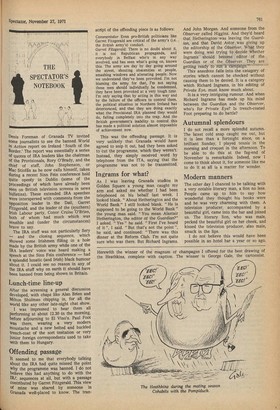' THE
SPECTATOR'S NOTEBOOK
Denis Foreman of Granada TV invited some journalists to see the banned World In Action report on Ireland ' South of the Border.' The report was essentially a series Of quotes of IRA leaders like the chairman Of the Provisionals, Rory O'Brady, and the Chief of staff, John Stephenson, or Mac Stioffin as he now calls himself, taken during a recent Sinn Fein conference held quite openly in Dublin (some of the Proceedings of which have already been seen on British television screens in news bulletins). These extended IRA speeches Were interspersed with comments from the Opposition leader in the Dail, Garret Fitzgerald, and the leader of the (southern) Irish Labour party, Conor Cruise O'Brien, both of whom had much which was sensible and (under the circumstances) brave to say.
The IRA stuff was not particularly fiery — and the closing sequence, which Showed some Irishmen filling in a hole made by the British army while one of the IRA leaders' voice was heard making a Speech at the Sinn Fein conference — had a splendid lunatic (and Irish) black humour about it. I could see no reason in any of the IRA stuff why on earth it 'should have been banned from being shown in Britain.
Lunch-time line-up
After the screening a general discussion developed, with chaps like Alan Brien and Milton Shulman chipping in, for all the World like any other late-night chat show.
I was impressed to hear them all Performing at about 12.30 in the morning, before adjourning to El Vino's. Paul Foot was there, weaning a very modern moustache and a new belted and buckled trench-coat of the sort imitation or very Junior foreign correspondents used to take With them to Hungary.
Offending passage
It seemed to me that everybody talking about the IRA had quite missed the point Why the programme was banned. I do not believe this had anything to do with the IRL sequences at all, but with a passage contributed by Garret Fitzgerald. This view of mine was shared by someone in Granada well-placed to know. The tran Commentator Even pro-British politicians like Garret Fitzgerald are critical of the army's (i.e. the British army's) conduct.
Garret Fitzgerald: There is no doubt about it, it is not Republican propaganda, and everybody in Belfast who's in any way involved, and has seen what's going on, knows this. The army are day by day going around the street, shouting obscenities at people, smashing windows and alienating people. Now we understand they've been provoked. I'm not blaming the army for that, I'm not saying these men should individually be condemned, they have been provoked at a very tough time. I'm only saying that by acting in this way and by the failure of the officers to control them, the political situation in Northern Ireland has deteriorated, and that they are doing exactly what the Provisional IRA planned they would do, falling completely into the trap. And the British government's inability to control this has made a political solution almost impossible of achievement now.
This was the offending passage. It is very unlikely that Granada would have agreed to snip it out, had they been asked to cut the programme, which they weren't. Instead, they simply received word by telephone from the ITA, saying that the programme was not to be transmitted.
Ingrams for what?
As I was leaving Granada studios in Golden Square a young man caught my arm and asked me whether I had been telephoned on his behalf last week. I looked blank. "About Hetherington and the World Bank." I still looked blank. "He is supposed to be going to the World Bank" the young man said. "You mean Alastair Hetherington, the editor of the Guardian?" I asked. " Yes " he said. "First I've heard of it ", I said. " But that's not the point ", he said, and continued: "There was this dinner at the Reform Club. I'm not quite sure who was there. But Richard Ingrains. And John Morgan. And someone from the Observer called Higgins. And they'd heard that Hetherington was leaving the Guardian, and that David Astor was giving up the editorship of the Observer. What they were doing was trying to decide whether Ingrams should become editor of the Guardian or of the Observer. They are getting ready to rifit n'a thrtiPaign."
This anecdote falls into the category of stories which cannot be checked without causing them to be denied. It is a category which Richard Ingrams, in his editing of Private Eye, must know much about.
It is a very intriguing rumour. And when Richard Ingrams has made up his mind between the Guardian and the Observer, who's for Private Eye? Is trench-coated Foot preparing to do battle?
Autumnal splendours
I do not recall a more splendid autumn. The latest cold snap caught me out, but it is less than a fortnight since, on a brilliant Sunday, I played tennis in the morning and croquet in the afternoon. To be able to do this at the fag-end of November 'is remarkable. Indeed, now I come to think about it, for someone like me to do it at all is a matter for wonder.
Modern manners
The other day I chanced to be talking with a very notable 'literary man, a lion no less. People came up to him to say how wonderful they thought his books were and he was very charming with them. A television producer, accompanied by a beautiful girl, came into the bar and joined us. The literary lion, who was male, pecked the beautiful girl on her cheek, and kissed the television producer, also male, smack in the lips.
I do not believe this would have been possible in an hotel bar a year or so ago.














































 Previous page
Previous page